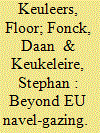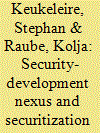|
|
|
Sort Order |
|
|
|
Items / Page
|
|
|
|
|
|
|
| Srl | Item |
| 1 |
ID:
147691


|
|
|
|
|
| Summary/Abstract |
Whilst concerns about the EU-centric character of EU foreign policy analysis have become more frequent in recent years, a systematic toolbox for diagnosing and remedying this problem is still lacking. This article’s contribution is twofold. First, it proposes a new typology of three approaches to foreign policy analysis, offering conceptual body and nuance to the debate on EU-centrism. The typology can be used for scrutinising existing analyses, as well as for shaping new research projects. Second, this typology is applied in a meta-analysis of post-Lisbon EU foreign policy scholarship: a built-for-purpose dataset of 451 articles was analysed, covering all work on EU foreign policy published in seven key journals for the period 2010–2014, was analysed. It was found that academic work on EU foreign policy wass indeed rife with EU-centric research questions, and, moreover, that this is the case irrespective of either the policy area under study or the focus of the journal.
|
|
|
|
|
|
|
|
|
|
|
|
|
|
|
|
| 2 |
ID:
159969


|
|
|
|
|
| Summary/Abstract |
Eurocentrism in the analysis of European foreign policy often renders scholars blind to other world views and realities, although engaging with these may be critical for understanding the relevance and impact of this policy in other parts of the world. Notwithstanding calls for decentring the study of International Relations and European foreign policy in particular, scholars of European foreign policy generally lack the tools and conceptual lenses to overcome Eurocentrism in their analyses. This article proposes an analytical framework to systematically open up for difference, and to see and understand dynamics and realities that go beyond dominant Eurocentric accounts, while trying to avoid the pitfalls of simplification and knowledge fragmentation. The framework consists of six partially overlapping decentring categories – spatial, temporal, normative, polity, linguistic, and disciplinary decentring – and is developed through two dimensions of the Decentring Agenda proposed by Fisher Onar and Nicolaïdis: ‘provincialising’ (questioning Eurocentric perspectives) and ‘engagement’ (learning from other perspectives). In this way, this article aims to support scholars of European foreign policy in overcoming Eurocentrism and in operationalising the Decentring Agenda.
|
|
|
|
|
|
|
|
|
|
|
|
|
|
|
|
| 3 |
ID:
169114


|
|
|
|
|
| Summary/Abstract |
This research examines throughout the rhetorical efforts of Chinese state media to externally legitimate the AIIB. To that end, it builds an analytical framework of legitimacy comprising four general dimensions—external, institutional, procedural and performance, each of which is substantiated by legitimacy claims specific to the AIIB. Empirically, the article is based on an in-depth content analysis of 730 AIIB-centric articles collected from four state media. The study finds the following: (1) Chinese state media grounded the AIIB’s justificatory rhetoric primarily on institutional legitimacy and external recognition, and more specifically, the bank’s utility, complementarity, and growing membership/support; (2) Chinese state media intensified rhetorical efforts following the UK’s announcement to join and increasing international attention on the new bank. The framework built and conclusions drawn herein can shed some light on China’s rhetorical legitimation of its emerging institution-building behavior.
|
|
|
|
|
|
|
|
|
|
|
|
|
|
|
|
| 4 |
ID:
126630


|
|
|
|
|
| Publication |
2013.
|
| Summary/Abstract |
This article assesses how and to what extent the European Union (EU) uses a security perspective to define and shape its relationship with the developing world. In order to evaluate the EU's development policy and its relations with developing countries we link the concept of 'security-development nexus' with the concept of 'securitization'. The article examines whether securitization can be observed with regard to four dimensions: discourse, policy instruments, policy actions and institutional framework. The analysis demonstrates a securitization of the EU's development policy and its relations with developing countries, particularly in Africa. However, paradoxically, the securitization's extent and nature suggest that the EU can also use it as a way to avoid a more direct involvement in conflict areas.
|
|
|
|
|
|
|
|
|
|
|
|
|
|
|
|
| 5 |
ID:
150583


|
|
|
|
|
| Summary/Abstract |
In July 2014 during the sixth BRICS summit, the leaders of Brazil, Russia, India, China, and South Africa launched the Fortaleza Declaration and Action Plan, suggesting a further intensification and institutionalization of their cooperation in the field of foreign policy, including within the framework of the United Nations. This article examines the extent to which the intensification of BRICS cooperation in the field of foreign policy is reflected in their voting patterns in the UN General Assembly. It presents an original dataset of the degree of voting cohesion among the five BRICS countries. It demonstrates that, overall, there is no significant increase in the degree of voting cohesion since the start of the consultations in the BRIC framework in 2006.
|
|
|
|
|
|
|
|
|
|
|
|
|
|
|
|
|
|
|
|
|